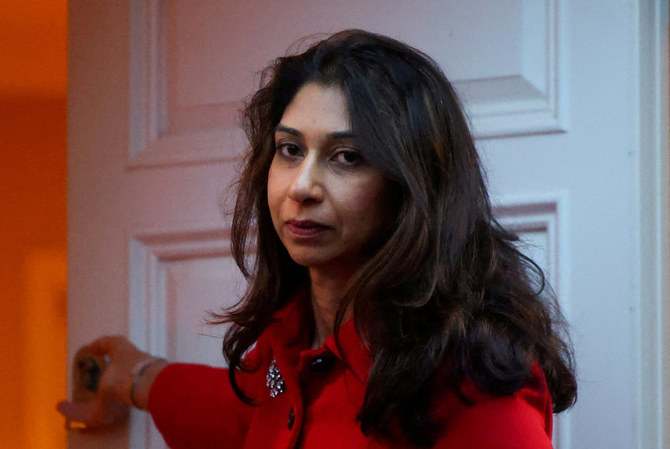
Priti Patel voiced concerns that the use of the technology, which is designed to guarantee security, could hinder official investigations into child abuse
The US tech giant intends to extend the use of end-to-end encryption, already in use on WhatsApp, to its Facebook and Instagram platforms next year
LONDON: Priti Patel, the UK’s home secretary, has urged Meta to ditch its plans for end-to-end encryption of messages on Facebook and Instagram. She described the move as a potentially “grotesque betrayal” of children and their safety.
The US tech giant intends to extend the use of encrypted messaging to the two platforms next year, but Patel warned that this would hamper the ability of authorities to investigate cases of online abuse of children.
End-to-end encryption, which is already enabled on Meta’s WhatsApp messaging service, is a technology that ensures the security of user communications. No one, including Meta or any third parties, can read messages that are sent using it.
Patel voiced her concerns in an article published by The Telegraph newspaper just weeks before a controversial Online Safety Bill, new UK legislation designed to regulate social media platforms, is expected to be signed into law. She said that the use of encryption technology would hinder investigations into child abuse.
“Parents need to know that their kids will be safe online,” said Patel. “The consequences of inadequate protections — especially for end-to-end encrypted social media platforms — would be catastrophic.
“A great many child predators use social media platforms such as Facebook to discover, target and sexually abuse children. These protections need to be in place before end-to-end encryption is rolled out around the world. Child safety must never be an afterthought.”
Patel said global tech companies reported more than 29 million suspected cases of child sexual abuse on their platforms last year, with Facebook alone recording 22 million instances of child abuse imagery.
“If I were to describe the content of some of this filth, you would be deeply distressed,” she added. “Technology companies need to recognize their moral responsibility to keep children safe.”
The UK government is taking steps to improve digital security through its Online Safety Bill, Patel said, and it is “reasonable to expect” that tech companies would also use their resources and expertise to address the issue.
Meta, which has had its encryption project in the pipeline for a couple of years, confirmed this month that it still intends to move forward with the plans. It came after the company found itself under intense scrutiny for providing police in the US state of Nebraska with access to private messages sent by a 17-year-old girl accused of crimes relating to an abortion.
Facebook, which said that nothing in the warrant the company received mentioned abortion, would not have been able to access or hand over any messages if end-to-end encryption had been in place, even if the authorities had a legally valid search order.
The use of the technology in its current state would also make it impossible for Meta or any authorities to search for images of child abuse shared in direct messages.
Patel expressed optimism about the possibility of collaboration between the government and Meta to address the issue and noted a number of ways in which this could be achieved, including the scanning of conversations.
“While some things are more important than profits, it is actually in the financial interests of technology companies that the public should have confidence that their products and services will not be used to hurt children,” she said.
A Meta spokesperson said: “Experts are clear that technologies like those proposed in this (bill) would undermine end-to-end encryption and threaten people’s privacy, security and human rights.
“We have no tolerance for child exploitation on our platforms and are focused on solutions that do not require the intrusive scanning of people’s private conversations. We want to prevent harm from happening in the first place, not just detect it after the fact.
“We already do this by banning suspicious profiles, restricting adults from messaging children they’re not connected with and defaulting under-18s to private or ‘friends only’ accounts. We’re also encouraging people to report harmful messages to us so we can see the reported contents, respond swiftly and make referrals to the authorities. We continue to work with outside experts and law enforcement to help keep people safe online.”












